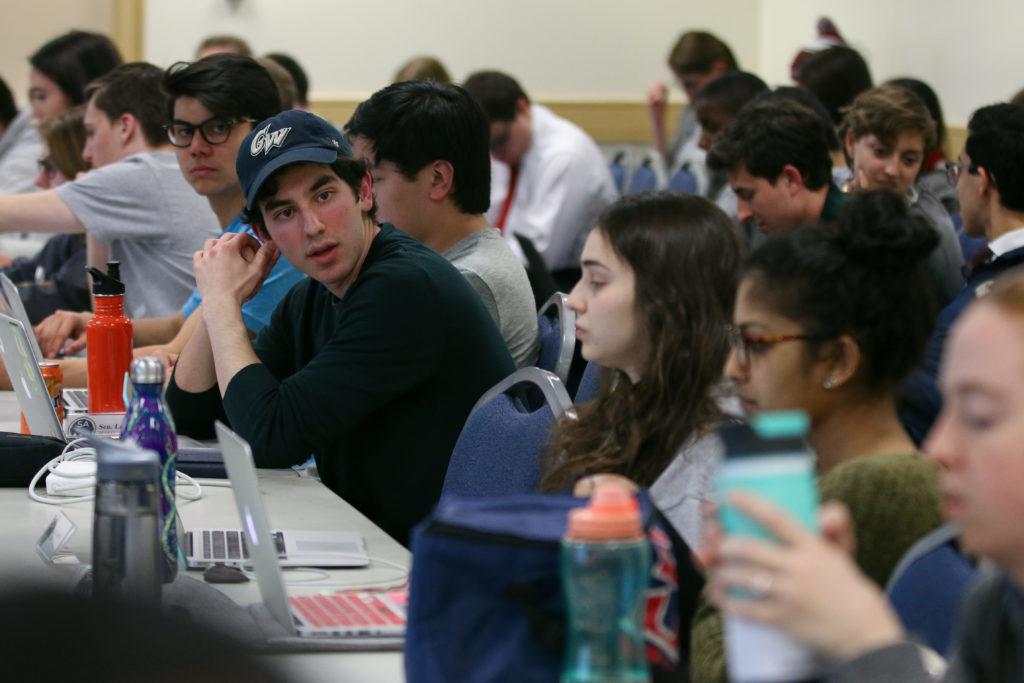Updated: March 26, 2019 at 9:44 p.m.
The Student Association Senate unanimously passed a roughly $1.2 million budget Monday to fund student organizations next academic year.
The finance committee doled out about two-thirds of the SA’s nearly $1.8 million total funds to student groups across campus – about $100,000 less than the amount allocated last academic year.
The remaining $600,000 is set aside for co-sponsorships – leftover funds to be distributed throughout the next academic year. Will Raderman, U-at-Large, and the chair of the finance committee, said the number may slide down to about $500,000 after the SA pays off debt to the University and rolls over unused funds from this academic year.
“We’re looking at a pretty hefty fiscal budget for next year – that means a lot of organizations can have a lot of support from that, which is really great,” Raderman said.
Raderman said the finance committee focused on funding more expensive items for student organizations – like rental spaces – which took up about one-fifth of total allocations. He said senators should advocate for lower rental room fees, which often discourage student groups from hosting events.
The senate also passed a resolution asking that the University create clear expectations for academic advising sessions. The resolution calls on officials to create an agreement detailing expectations of students to conduct outside research ahead of advising sessions and expectations of advisers to know degree requirements and to follow up with students after their appointments.
The senate passed a resolution in March calling on the University to create online advising sessions and offer more flexible office hours for graduate students. SA leaders also released a report last week highlighting pitfalls in student-adviser relationships across schools.
SA President Peak Sen Chua, who sponsored the resolution, said students and advisers often don’t fully grasp their relationship with each other, which the resolution would address by creating clear guidelines for both parties to follow.
“We want to make sure we make that clear and students understand that part of the relationship and advisers understand that portion of the relationship,” he said.
The senate also passed a resolution titled “We Say McNo,” criticizing officials and University President Thomas LeBlanc for selecting Marcia McNutt, the president of the National Academy of Sciences, to serve as the Commencement speaker this year. Students quickly criticized the decision after it was announced in March, saying McNutt wasn’t as well-known as previous speakers and came from a science background, while many students study social sciences.
LeBlanc defended the choice during an interview with a campus radio station last month, saying that he could “live with” criticism surrounding McNutt’s selection because most of the disapproval came from “privileged” non-science and engineering students.
Sen. Jan Yonan, CCAS-U, and a sponsor of the resolution, said McNutt was selected by the Office of External Relations rather than a committee of students and administrators who were meant to collaborate to select the keynote speaker. The resolution demands that the OER release a statement explaining how members chose McNutt and who was involved in the process.
“This choice to choose Marcia McNutt – while she is an accomplished scientist – is a real product of failure of communication and collaboration between students and administrators of this University,” Yonan said.
The senate also unanimously passed a resolution thanking SA Executive Vice President Sydney Nelson for her advocacy work this year. The resolution, called “I Am the Senate,” asks that the senate refer to the 2017-18 academic year as the “Nelson era” in recognition of her service to the GW community.
Monday was the final meeting of the senate’s current term.
“We all know the impact Sydney has had on all of our lives at the SA this year,” Chua, who co-sponsored the legislation, said. “She has been here for every single one of us, every step of the way.”
Johnny Morreale contributed reporting.





